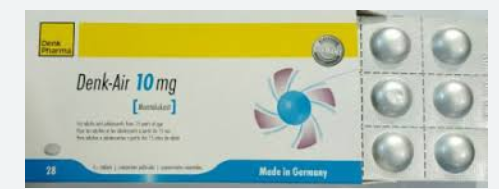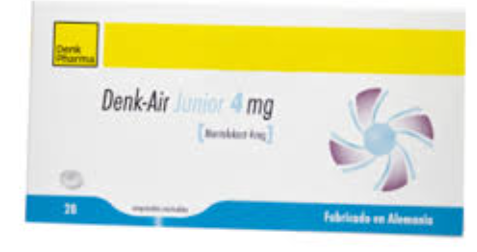Montelukast
Welcome to Dwaey, specifically on Montelukast page.
This medicine contains important and useful components, as it consists of
Montelukast is available in the market in concentration.
Generic Name of Montelukast - Learn More
Montelukast
Montelukast Precaution - What You Need to Know
Before starting Montelukast, it is crucial for patients to consult their healthcare provider to ensure the medication is appropriate for their specific condition. Montelukast is commonly used for the management of asthma and allergic rhinitis, but several precautions should be considered:
- Neuropsychiatric events: There have been reports of mood changes, anxiety, depression, agitation, sleep disturbances, and suicidal thoughts in patients taking Montelukast. Patients and caregivers should be vigilant for any behavioral changes, especially in children and adolescents, and seek immediate medical advice if any psychiatric symptoms occur.
- Pre-existing liver conditions: Montelukast is metabolized in the liver, so patients with a history of liver disease or impaired liver function may require dosage adjustments or close monitoring during treatment.
- Allergic reactions: Although rare, some patients may develop severe allergic reactions to Montelukast. Signs such as rash, itching, swelling of the face, lips, or tongue, and difficulty breathing should prompt immediate discontinuation of the drug and medical consultation.
- Asthma exacerbations: Montelukast should not be used for the acute treatment of asthma attacks. Inhalers or other rapid-acting medications should be used for this purpose. Montelukast is meant for long-term management, and its use should not replace emergency asthma treatment.
- Pregnancy and breastfeeding: Montelukast falls under pregnancy category B, indicating that it is generally considered safe during pregnancy. However, it should be used only when the potential benefits outweigh the risks. It is also excreted in breast milk, so a healthcare provider should assess whether to continue the medication during breastfeeding.
Montelukast Indication - Uses and Benefits
Montelukast is primarily used for the following indications:
- Asthma management: Montelukast is indicated for the long-term management and prevention of asthma in both adults and children. It helps to control chronic asthma symptoms and reduce the frequency of asthma attacks. Montelukast is used as a maintenance treatment and may be combined with other medications such as inhaled corticosteroids.
- Allergic rhinitis: Montelukast is also indicated for the treatment of seasonal or perennial allergic rhinitis. It helps to alleviate symptoms such as sneezing, runny nose, and nasal congestion by reducing inflammation caused by allergens.
- Exercise-induced bronchoconstriction: Montelukast can be prescribed to prevent bronchoconstriction (narrowing of the airways) that occurs after exercise, especially in individuals with asthma or exercise-induced asthma. It helps to improve exercise tolerance and reduce the likelihood of asthma symptoms triggered by physical activity.
Montelukast is typically prescribed as part of a comprehensive treatment plan to manage asthma and allergies. It is not intended for the treatment of acute symptoms, but rather for the prevention and long-term control of these conditions.
Montelukast Contraindications - Important Warnings
Montelukast should not be used in certain situations to ensure patient safety:
- Hypersensitivity: Montelukast is contraindicated in patients who have a known hypersensitivity or allergic reaction to the medication or any of its components. This could result in a severe allergic reaction such as difficulty breathing or swelling of the face and throat.
- Acute asthma attacks: Montelukast is contraindicated for the immediate relief of acute asthma attacks. It is a preventive medication and should not be used in place of rapid-acting bronchodilators or other emergency asthma medications.
- Severe liver disease: While Montelukast is not specifically contraindicated for liver impairment, caution is advised in patients with severe liver conditions. In such cases, the healthcare provider may need to adjust the dosage or monitor the patient more closely.
- Pregnancy category: Montelukast is generally considered safe during pregnancy (Category B), but it should only be used if the benefits justify the potential risks to the fetus. It should not be used unless prescribed by a healthcare provider who has carefully evaluated the risks.
Montelukast Side Effects - What to Expect
Montelukast is generally well-tolerated, but it may cause some side effects. These can range from mild to severe:
- Common side effects:
- Headache: A mild headache is one of the most commonly reported side effects of Montelukast.
- Gastrointestinal issues: Some individuals may experience stomach pain, nausea, or diarrhea.
- Fatigue: Drowsiness or general fatigue may occur, especially when starting the medication.
- Serious side effects:
- Neuropsychiatric symptoms: Rarely, Montelukast has been associated with mood changes, depression, anxiety, and sleep disturbances. In some cases, suicidal thoughts or behavior have been reported, particularly in children and adolescents.
- Allergic reactions: Though uncommon, severe allergic reactions such as swelling of the lips, face, tongue, or throat, difficulty breathing, or hives can occur. These symptoms require immediate medical attention.
- Liver enzyme abnormalities: Although rare, Montelukast may cause liver function abnormalities, and liver function should be monitored if any symptoms suggest liver issues (e.g., jaundice, dark urine, abdominal pain).
- Upper respiratory infections: Some people may experience upper respiratory tract infections while on Montelukast, which could include symptoms like a sore throat or congestion.
Patients should report any unusual symptoms, especially related to mood or behavior changes, to their healthcare provider.
Montelukast Pregnancy Category ID - Safety Information
2
Montelukast Mode of Action - How It Works
Montelukast is a leukotriene receptor antagonist (LTRA). It works by blocking the effects of leukotrienes, which are chemicals released in the body during allergic reactions or asthma exacerbations. Leukotrienes contribute to inflammation, bronchoconstriction (narrowing of the airways), and mucus production in the airways.
By inhibiting the leukotriene receptors, Montelukast prevents the effects of these chemicals, thus reducing inflammation and swelling in the airways, preventing bronchoconstriction, and making it easier for individuals to breathe. This action helps to control asthma symptoms and reduce the frequency of asthma attacks, as well as alleviate symptoms of allergic rhinitis such as nasal congestion, sneezing, and itching.
Montelukast also works to prevent exercise-induced bronchoconstriction, improving exercise tolerance in individuals who experience asthma symptoms triggered by physical activity.
Montelukast Drug Interactions - What to Avoid
Montelukast can interact with several other medications, potentially altering its effectiveness or causing adverse effects:
- Phenobarbital and phenytoin: These medications, used for seizures, can increase the metabolism of Montelukast, reducing its effectiveness. If a patient is taking either of these anticonvulsants, a dose adjustment of Montelukast may be required.
- Rifampin: Rifampin, an antibiotic commonly used to treat tuberculosis, may reduce the effectiveness of Montelukast by increasing its metabolism in the liver. Adjustments to the dose may be needed when both medications are prescribed together.
- Other leukotriene inhibitors: Combining Montelukast with other leukotriene receptor antagonists (such as zileuton) should be avoided, as it may increase the risk of side effects.
- Warfarin: There is no significant interaction between Montelukast and warfarin, a common blood thinner. However, it is always recommended to monitor INR (International Normalized Ratio) levels when using warfarin, especially during the initiation of any new medication.
- Aspirin or NSAIDs: Nonsteroidal anti-inflammatory drugs (NSAIDs), including aspirin, may worsen asthma symptoms in some individuals. While Montelukast itself does not directly interact with these drugs, caution is needed when both are used in patients with aspirin-sensitive asthma.
Patients should always inform their healthcare provider of all medications, including over-the-counter drugs and supplements, before starting Montelukast to prevent harmful interactions.
Montelukast Adult Dose - Recommended Dosage
The typical adult dose of Montelukast is:
- For asthma: 10 mg once daily, preferably in the evening.
- For allergic rhinitis: 10 mg once daily, typically in the evening.
- For exercise-induced bronchoconstriction: 10 mg taken at least 2 hours before exercise.
Montelukast can be taken with or without food. It is important to follow the prescribed dosing regimen and not exceed the recommended dose.
Montelukast Child Dose - Dosage for Children
The dosage of Montelukast for children varies based on age:
- For children aged 6–14 years: 5 mg once daily, preferably in the evening.
- For children aged 2–5 years: 4 mg once daily, preferably in the evening (usually in the form of a chewable tablet or granules).
- For children under 2 years: Montelukast is not recommended for children under the age of 2.
It is important for parents or caregivers to consult a pediatrician for the appropriate dose and to monitor for any side effects, especially neuropsychiatric symptoms, in children.
Montelukast Renal Dose - Dosage for Kidney Conditions
Montelukast is not significantly cleared by the kidneys, and no specific dosage adjustment is recommended for patients with renal impairment. However, caution should be exercised in individuals with severe kidney disease. Close monitoring may be necessary in such cases, and the healthcare provider may adjust the treatment as needed.



